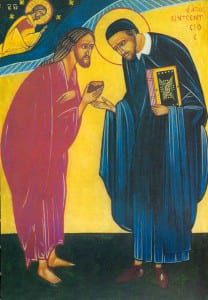 Word on Fire Blog – Vincent de Paul
Word on Fire Blog – Vincent de Paul
“I do not think that St. Vincent had mapped and plotted out in his mind that he would found so many institutions, groups or orders…. Rather, he said “yes” to the poor person who came to him… He recognized Christ in the need of the moment and he said yes to the invitation and he made a step. He did something!”
The full blog reads…
You can probably surmise a bit about today’s saint from what you know about the “St. Vincent de Paul Society,” a group directly involved in feeding the hungry and clothing those in material need. But do you know much about St. Vincent de Paul, himself? Fr. Michael Cummins introduces this champion of the corporal works of mercy on today’s blog post.
We are told in Scripture that a tree is known by its fruits. Throughout the centuries the saints witness this in abundance. These men and women who let their lives be transformed by their encounter with the risen Christ had accomplishments that inspire and that still affect and bring life to our world. The accomplishments of St. Vincent de Paul, born to a simple peasant family in the late sixteenth century, are breathtaking in their scope.
St. Vincent moved in the circles of the rich and powerful of his day but rather than getting lost in that world (which so many do) he was able to make use of those friendships to bring aid and need to the poorest in society. This French saint devoted his life to works of charity and established groups throughout his life that worked to bring aid and comfort to the poor: orphans, widows, prostitutes, the sick, and the imprisoned all benefited from Vincent’s care. In a time when the education of the clergy was severely lacking and in need of reform, St. Vincent established the Congregation of the Missions (Vincentians) with the express purpose of preaching the gospel and training the clergy. With St. Louise de Marillac he co-founded the Daughters of Charity. But rather than giving a listing of accomplishments it is more beneficial, I believe, to reflect on what faith lessons are revealed in the life of this saint.
Christ was born in a poor and crude stable. (We know this from the story of Christmas.) Christ continues to be born in the poor and abandoned places of our world. If one wants to encounter Christ, one should go to these places. This, I believe, is a truth that St. Vincent learned early in his life, and it gave him the needed compass and focus to navigate all the twists and turns of his day. Whether it was from his own experience of growing up in a poor peasant family, his experience of being enslaved for two years, his pastoral experience as a parish priest or probably a mixture of all three, St. Vincent came to recognize Christ in the faces of the poor and the abandoned of society. I would hazard a guess that this was more than just an abstract awareness on St. Vincent’s part. I think that St. Vincent “met” Christ in the poor in all senses of the term and that he realized that his discipleship and priesthood must be founded in that ongoing encounter. He realized that where the master was then the disciple must also be.
He also realized that where the master leads then the disciple must follow. In reading over the story of his life we find that St. Vincent was a person keenly aware of the needs of his time and someone who learned how to respond to those needs. Rather than seeing the needs of his time (whether they be the need of the poor and imprisoned or the need of clergy) as an annoyance, St. Vincent recognized the presence of Christ in the need and he recognized the moment as an invitation given by Christ to come and follow him.
I do not think that St. Vincent had mapped and plotted out in his mind that he would found so many institutions, groups or orders to see to the needs of the poor and the clergy. Rather, he said “yes” to the poor person who came to him, he went one day to go visit the imprisoned, he decided that he had something to offer to help in the education of the clergy. He recognized Christ in the need of the moment and he said yes to the invitation and he made a step. He did something!
Christ continues to be born in the poor and abandoned places of our world. When we go to the poor we will find Christ. We do not have to have a master plan or worry it all through; we just need to say “yes” to the invitation in the moment. St. Vincent did this and he met Christ. It transformed his life and his life continues to transform our world.Fr. Michael Cummins is a Word On Fire blog contributor and serves as the Vocation Director for the diocese and Chaplain to Notre Dame High School and the Catholic Student Center at the University of Tennessee in Chattanooga. Fr. Michael is a member of the Community of Sant’Egidio.
Related
Tags:
Vincent,
Word on Fire
![]() Word on Fire Blog – Vincent de Paul
Word on Fire Blog – Vincent de Paul